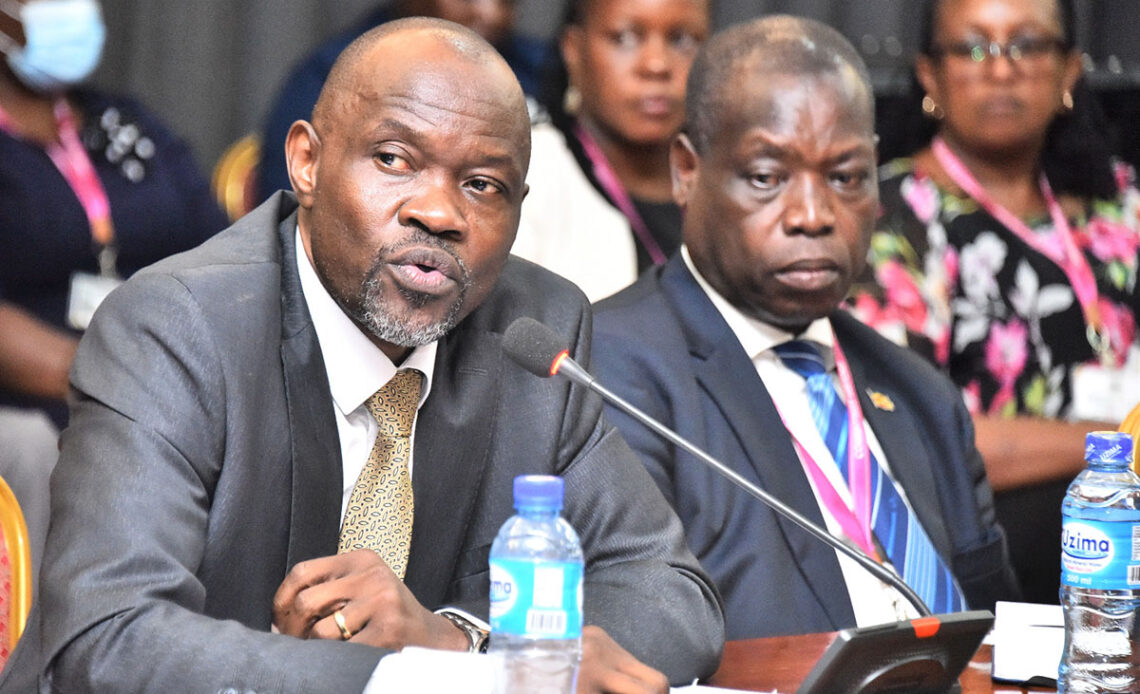
The former Executive Director of the Uganda National Bureau of Standards (UNBS), David Livingstone Ebiru, submitted an appeal with the High Court to delay his prosecution on bribery charges until the Inspectorate of Government’s investigation was finished. The application was denied.
The application against the Attorney General was rejected by Anti-Corruption Division Judge Jane Okuo Kajuga on Wednesday.
She reasoned that the application was improperly brought before the High Court because it lacked the necessary territorial and material jurisdiction to uphold Ebiru’s human rights.
Ebiru is accused of providing Charles Masekuura, the chairman of the UNBS board, with a bribe or other kind of inducement in order to obtain his job as the UNBS ED between October and December of 2022.
The Chief Magistrates Court, chaired by Joan Aciro, issued an arrest warrant for Ebiru on August 8, 2023, instructing the police to detain him as soon as they come across him.
But since there has been no progress in getting him arrested, he has filed a complaint against the Attorney General to overturn the criminal trial.
Ebiru argued in his application, through his attorneys at Web Advocates, that he was wronged by the Inspectorate of Government’s (IG) decision to approve charges against him without first carrying out any investigation.
He attempted to put an end to the trial, claiming that the IG’s actions in obtaining an arrest warrant and recommending charges had violated his fundamental rights and liberties.
Ebiru also asserted that his motion was pointless because there was an active arrest warrant at the Anti-Corruption Court and that its enforcement was near.
He asked the court to rule that the criminal summons, arrest warrant, and trial were unlawful as part of his legal defense.
In addition, he requested an order for restitution against the government for violating his fundamental rights and a permanent injunction against the Inspector General of Government (IGG) and her agents from filing accusations against him.
Nonetheless, the Attorney General asked the court to reject the request for an interim injunction through Principal State Attorney Wanyama Kodoli.
The Attorney General contended that cases pertaining to the enforcement of human rights ought to have been filed somewhere else, as the Anti-Corruption Court Division (ACD) lacked jurisdiction to consider them.
According to Wanyama, the ACD was created as a specialist division with the exclusive power to deal with matters involving corruption.
Therefore, it was inappropriate for Ebiru to file his case in the ACD given that it was a civil matter.
Ebiru’s attorney responded by claiming that the Human Rights Enforcement Act gives the Magistrates Court and High Court, which hear criminal cases, the power to look into human rights abuses that occur in their courts.
He continued by saying that the court hearing these cases may use civil law or procedural means to grant an injunction stopping the action.
As per the Attorney General’s views, Justice Kajuga dismissed the application on the grounds of lack of jurisdiction in her ruling on Wednesday.
She clarified that the case in front of her stemmed from a criminal case that was still pending at the Chief Magistrates Court, where Ebiru was wanted for arrest and had not yet made an appearance.
The Chief Magistrates Court should have been the forum for discussing concerns pertaining to human rights abuses, Justice Kajuga stressed, since the High Court could only get involved in corruption-related cases if they were brought to it by the lower court and were already on the docket.
She clarified further that since the case against Ebiru had not yet been committed to the High Court for trial—a step that could only be taken by the Magistrates Court—the High Court could not intervene in a matter filed directly before it, deviating from the original legal procedure.
Because of the Attorney General’s preliminary objection, Justice Kajuga thus rejected both the main lawsuit and the motion for a temporary injunction.
Silas Kahima Mugabi, Ebiru’s attorney, said he will confer with his client to decide the next course of action after the decision.
These may be bringing up the same human rights abuses in front of the Magistrates Court, thinking about filing an appeal, or showing up for prosecution.
It’s important to note that, despite claims to the contrary, Ebiru has always said that his remarks were motivated by rage and that he had never bribed anyone. Ebiru apparently acknowledged paying the UNBS board 100 million Shillings to escape suspension—a figure he supposedly borrowed.

